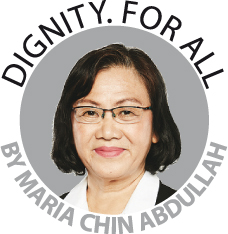INDEPENDENT Police Complaints and Misconduct Commission (IPCMC) has often been perceived as dealing with police mishandling of inmates, detainees, corruption and abuse of powers. IPCMC is more than just that. It is about establishing an institutional change that builds on human rights standards in accordance with our Federal Constitution, domestic laws and international human rights instruments. It empowers the police to set the norms for policing and security as well as to rebuild the trust of the public.
As aptly stated in the Report of the Royal Commission to Enhance the Operation and Management of the Royal Malaysia Police:
Upholding human rights needs to become a central pillar of policing, one of the key and essential criteria by which police actions are scrutinised and the foundation of the ethical code for policing. This does not mean that observance of human rights is absent in PDRM, or that PDRM is riddled with human rights abuse (though numerous instances of infringements do occur...). It merely means that the essence of policing has yet to be understood, ultimately, not only as the maintenance of law and order, but also as the observance and protection of human rights. It also means that PDRM has to dramatically improve its compliance with human rights and the human rights provisions inherent in the country’s laws.
The Royal Malaysia Police boasts a total of 113,336 officers, and it has contributed to the security of this nation and made attempts to restructure to project a more positive image. However, there are deeper issues that need to be addressed.
Between 2010 and July 2017, Parliament confirmed that 1,808 prisoners died in prison, which means an average of 226 deaths in custody a year. Suara Rakyat Malaysia’s (Suaram) Human Rights Report 2018, while recognising the reduced number of reported police abuse cases, notes that police management of prisoners is still wanting. Soh Kai Chiok died in Triang police station on Jan 18, 2017 due to inadequate medical treatment. Meanwhile, the EAIC confirmed that S. Balamurugan’s death was due to physical violence inflicted by police personnel.
So, it was a breath of fresh air when in June 2018 Federal Court judge Justice Balia Yusof Wahi affirmed that the courts must interfere when the freedom of individuals is affected by unlawful detention on the part of law enforcement agencies. He asserted that assault in custody must be abhorred and the police cannot be allowed to abuse their power.
Recently, a serious public inquiry report by the Malaysia Human Rights Commission (Suhakam) had concluded that Amri Che Mat and Pastor Raymond Koh, who vanished in 2016 and 2017 respectively, were victims of enforced disappearance. Suhakam commissioner Mah Weng Kwai said: “The panel is of the considered view that the enforced disappearance of Amri Che Mat was carried out by agents of the state, namely, the Special Branch, Bukit Aman, Kuala Lumpur, within the definition of the first limb of Article 2 of the International Convention for the Protection of All Persons from Enforced Disappearance (ICPPED)”. A similar conclusion was made on the disappearance of Pastor Koh.
Under Article 2 of the International Convention for the Protection of All Persons from Enforced Disappearance, enforced disappearance is defined as “the arrest, detention, abduction or any other form of deprivation of liberty by agents of the State or by persons or groups of persons acting with the authorisation, support or acquiescence of the State, ...”
The ball is now with the Cabinet, Parliament and its select committee to act on Suhakam’s report and if proven true, punitive action needs to be taken. For too long complaints on the culture of impunity for wrongdoings, poor governance, and use of violence have plagued the police and tarnished its image.
The slow and sometimes non-committal responses to the disappearances of Pastor Koh, Amir, Hilmy and Ruth and the findings of Suhakam, have further cast aspersions on the police
It is time to correct and institutionalise the restructuring of the police force at all levels. IPCMC can bring about an “emergence of a revitalised and modern police service that is efficient, clean and trustworthy, dedicated to serving the people and the nation with integrity and respect for human rights.” It is not meant to be a stand alone reform. Police officers and its agencies are unsupported, under-resourced and work in extremely challenging circumstances. The police force is not spared from low salaries and housing quarters which have deteriorated over the years. The morale of police personnel who are willing to risk their lives to maintain our safety and security must also be uplifted.
Under the 2019 budget for the Home Ministry and Defence Ministry, RM30.9 billion was allocated for housing, schools, infrastructure and strengthening national security.
Moving forward, Prime Minister Tun Dr Mahathir Mohamad had announced for the Enforcement Agency Integrity Commission (EAIC) to be strengthened and converted into the IPCMC. The public complaints bureau will be turned into an independent ombudsman to manage public complaints. This helps bridge the misconception of the police and reduce, if not eliminate, misconduct of police officers in their policing. A caveat must be made to remind the authorities that it is important for IPCMC to be given the “teeth” to carry out its work which EAIC did not have. This includes to receive complaints, have investigative powers, an oversight body, internal mechanisms to discipline wrongdoings and an audit system to monitor the operations and procedures of the police. To complement IPCMC, an independent ombudsman can be set up to receive complaints and feedback.
This will certainly rebuild citizens’ trust in the police with an expectation that they practise principles of proportionality, legality, accountability and protection of freedoms and rights when limiting the rights of a person.
Comments: letters@thesundaily.com











